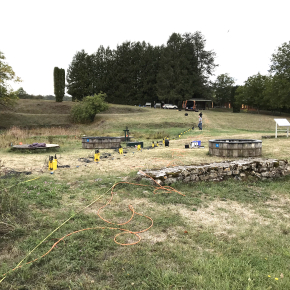CDD
Reliability predictors assessment of satellite-based solar energy forecast
Contexte
Forecasting the solar energy reaching photovoltaic (PV) plants helps to cope with the variability of this renewable resource and thus increases its share in the energy mix. For specific applications such as microgrid self-consumption optimization, solar irradiance forecast should be available at local scale (cities, neighbourhood) with a sub-hourly time sampling and refresh. Geostationary meteorological satellite images processing enables to provide irradiance forecast at horizons from the next minutes to the next hours with a refresh frequency up to 15 or 10 minutes, with a higher accuracy than classic numerical weather prediction (NWP) models.
Operational since the early 2010s mainly for energy trading at country scale, expanding their usage in micro-grid applications necessitate to reduce their uncertainty. Indeed, forecast errors are highly dependant on stochastic cloud cover motion at mesoscale. Limited in cases of clear-sky and stable cloud advection, forecast errors increase significantly with complex cloud patterns (convection, disappearance, multi layered motion, small scale broken clouds …). Cloud cover behaviour at this scale results depends from many weather parameters with a badly known interdependency. Machine-learning approaches attempt to overcome this issue with promising results. Meanwhile, resulting methods take the risk of lacking robustness if a given weather situation has not been encountered during the training phase. Moreover, machine-learning model parameters are never able to describe explicitly a given atmospheric state. This “black box” effect makes the forecast improvement difficult and hazardous due to a disconnection between the model and atmospheric physics.
Defining statistical links between satellite-based forecast results and weather situations described by meteorological variables provide useful information for :
- helping users to anticipate errors magnitude of order from an observable weather situation.
- Defining probabilistic scenarios and thus reliability information about every given satellite-based forecast, and
- qualifying a weather situation as an a priori knowledge in advanced statistical or machine-learning models.
For example, a dependence between forecast accuracy and weather regimes occurring in the Paris area has been highlighted by Cros et al. (2020). It enables to anticipate forecast uncertainty as weather regime of Western Europe can be known several days in advances.
Description
The main objective of this research work consists in identifying and assessing new predictors, in particular if the latter are easy and cheap to obtain in operational conditions. Laboratoire de Météorologie Dynamique holds a 7-year database of intraday solar forecast results over Ecole Polytechnique Campus in co-location with punctual meteorological measurements from more than 150 instruments of the SIRTA observatory as well as PV production data from Polytechnique start-up incubator roof available every minutes from October 2020. Moreover, Institut Pierre-Simon Laplace infrastructure eases the access to various meteorological datasets at global scale (ex. ERA-5 reanalysis). These huge datasets offer a particular opportunity to increase knowledge in PV production variability. The expected duties are:
- Bibliographical watch around this topics
- Maintain and update the database of satellite-based forecast results colocated with potential predictors
- Select new predictors according to literature, recommendations from project partners and operational feasibility
- Propose and implement efficient statistical descriptions between predictors and forecast results
- Writing articles and presenting results in international conferences. Participate in project meeting
This position is funded by the project Fine4Cast (PEPR-TASE) including partners from Mines Paris (PERSEE & OIE centers), Météo-France (CNRM), Université de la Réunion (PIMENT) and Université Grenoble Alpes (G2ELab).
To apply
Please send CV and motivation letter before 20th September 2023 to:
Compétences requises
- Education: PhD in meteorology, applied mathematics, data science or equivalent
- Computer skills: Python in Linux Shell environment
- Strong interest in Earth observation and solar energy integration issue
- Knowledge of renewable energy weather dependence
- Excellent written and communication skills in English
- French speaking and writing skills are strongly encouraged






